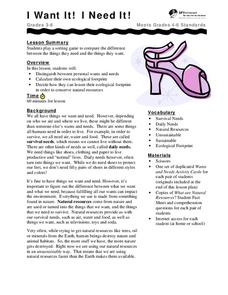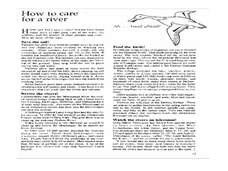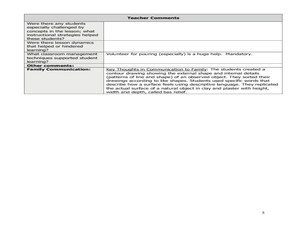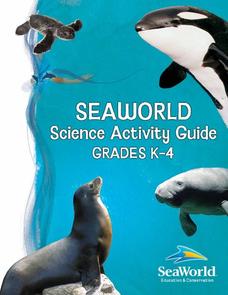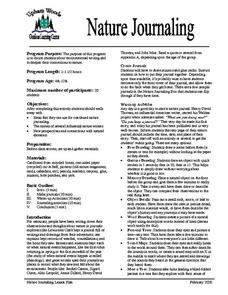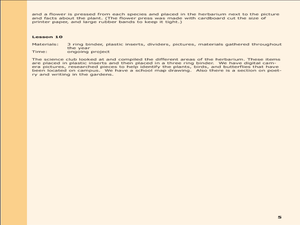Berkshire Museum
Nature Journaling: Experience the Outdoors Through Writing and Drawing
Step into the great outdoors and develop young scientists' skills of observation with a nature journaling lesson. Given a specific focus or goal, children practice making and recording observations of nature through written descriptions...
Curated OER
The Natural State
Following an examination of the Arkansas state quarter, your class will discuss the state's nickname: "The Natural State." They will focus on its abundance of natural resources. Printables for the activities are included.
NASA
Natural Resources on Earth
Natural resources do not always occur so naturally. Lead classes through a thorough set of lessons investigating the natural resources important for plants. Learners complete a series of worksheets as they explore the information and...
California Academy of Science
Natural Resources Bingo
Bingo isn't just a silly game, it's a great way to practice all types of skills. After reviewing that the earth is composed of natural resources, what those natural resources are, and sustainability, the class plays a game of bingo. The...
Curated OER
Mother Nature Has Her Say
Students use their creative writing skills to develop interview questions for Mother Nature. Using writing, they respond to the questions another student developed and use the internet to research any topic they need more information on....
Curated OER
Disasters (Natural & Man-made)
Students chose a natural or man-made disaster, such as a tornado or an oil spill, to research using the assigned web sites. They choose a presentation type from a list which includes poetry, radio broadcasts, and safety brochures, to...
Curated OER
Science-Observation Skill Builders
Pupils explore observation while making connections between observation skills and careers (like how farmers observe the weather). They view a variety of nature photographs on the computer and practice their observation skills by...
City and County of San Francisco
I Want It! I Need It!
Discuss wants and needs with your elementary ecologists and get them to consider what would happen to our natural resources if we all got everything that we want. Learners play a card sorting game and take an ecological footprint quiz on...
Curated OER
Virtual Nature Walk
Learners use the internet to take a virtual nature walk. Identifying animals found in specific forest habitats, they list their characteristics. They research various animals using the internet and create a PowerPoint slideshow with the...
Curated OER
Visit to Nature
Students complete a science journal which contains pages in which they can predict what they think they will see before the field trip, and also pages to write down what they actually do see during the field trip.
Curated OER
The Delicate Balance - Iowa's Natural Resources
Discover the natural resources in Iowa by studying it's history. For this environmental lesson, your students will observe a topographical map of Iowa and identify where its most valuable resources are. They complete an Iowa name...
Curated OER
What is an Ecological Footprint?
Introduce youngsters to the term ecological footprint. Learners identify ways in which humans affect the environment. They look at the problems associated with the use of natural resources, and focus on ways to preserve natural...
Curated OER
Plaster Casts of Natural Objects
Fourth graders observe objects in science and create a contour picture of the the object. In this arts and science observation lesson, 4th graders develop a clay sculpture of their object. Students generate a list of texture words to...
Purdue University
Let’s Go Outside
Nature is good for the soul. The final activity in the fine-part Family Nature Program series discusses the benefits of having an active connection with nature. Learners complete an imagery activity that relates nature to a calming...
Sea World
Seaworld Science Activity
A fun collection of activities about marine life would be a great addition to your elementary science unit. From cute penguins to scary sharks, the unit features crafts, experiments, and basic research projects that will teach your...
American Forest Foundation
Who Speaks for the Trees?
Help young conservationists appreciate the important role that trees play in ecosystems around the world with this collection of six engaging activities. From a shared reading and class discussion of Dr. Seuss' The Lorax, to in an depth...
Illinois Department of Natural Resources
Section One: What is Biodiversity?
Four intriguing and scientific activities invite learners to explore the natural resources of their town. The activities cover concepts such as genetic traits, organizing species in a taxonomy, the differences between different species...
Curated OER
Nature Journaling
Writers participate in a unique form of environmental writing and deepen their connections to nature through journaling. They generate new ideas and thoughts that they can use for continued nature journaling and explore a variety of...
Illinois Department of Natural Resources
Section Two: Why is Biodiversity Important?
Explore soil, genetic traits, natural resources, and pollution in a series of lessons that focus on biodiversity. Kids complete experiments to learn more about the importance of varied genes and organisms in an ecosystem.
California Academy of Science
Composting: A Scientific Investigation: California Academy of Sciences
Garbage, recycle, compost: Does it really matter where we put our trash once we are done? By making detailed observations over seven weeks, kids will see which materials break down naturally to become a healthy part of the soil, and...
STEM for Teachers
Tsunami!
How does the depth of an ocean affect the speed of a tsunami's waves? Use Jell-o, graham crackers, and marshmallows to model the effects of an underwater earthquake and its resulting tsunami. The instructional activity includes hands-on...
Curated OER
Nature Oriented Kindness Projects
Students complete various nature activities where they work together to create a butterfly garden, plant flowers, learn about nature survival, and more. In this nature lesson plan, students work together in groups and display kindness...
Curated OER
Compare Human-made Objects with Natural Objects
Students examine and observe how many human-made objects get their basic design from things in nature. They listen to the book "Nature Got There First," compare/contrast hollow bones with drinking straws, bird beaks and tool pliers, and...
Curated OER
Is That Natural?
Students examine how they use and waste natural resources. They participate in a class discussion about natural resources, in small groups complete a worksheet identifying ways students misuse natural resources, and create an...
Other popular searches
- Science Natural Disasters
- Science Natural Phenomena
- Science Natural Resources
- Science Natural Events
- Science Natural Cycles
- Natural Science Grade 9
- 4th Grade Natural Science
- Natural Science Powerpoint
- Natural Science Grade 3
- Science Materials Natural









